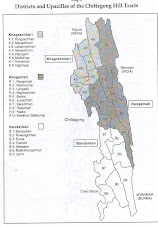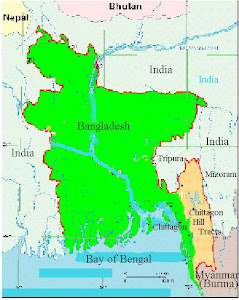Sources- http://www.thedailystar.net/story.php?nid=49331
Indigenous people in the Chittagong Hill Tracts (CHT) are now under threat from large-scale displacement due to land grabbing, setting up of parks and social forestation, Bangladesh Indigenous Peoples Forum (BIPF) leaders said yesterday.
The situation might worsen further due to the absence of constitutional recognition of indigenous people's identity and rights, lack of effective policy, non-implementation of the CHT Treaty and non-functioning of the CHT Land Commission, BIPF leaders said at a press conference at the National Press Club in the capital on the occasion of the International Day of the World's Indigenous People to be observed on Saturday with the theme "Indigenous People's Economic and Social Rights".
"The indigenous people are in a bad condition as they are increasingly falling victims to land grabbing," said BIPF President Jyotirindra Bodhipriya Larma, popularly known as Santu Larma.
The United Nations (UN) General Assembly decided to celebrate the day on August 9 every year adopting a resolution on December 23, 1994.
The BIPF has taken elaborate programmes including discussion, seminar, rally, fair, film show, photography exhibition and traditional dance programmes to observe the day.
Although Bangladesh is a member of the UN, the government neither observed the day at state level nor took any step to ensure the rights of indigenous people as per the recommendations by the UN or international communities, said Santu Larma, also the chief of the CHT Regional Council.
Referring to the UN Declaration on Rights of Indigenous People, he said the indigenous people cannot be ousted from their lands.
“The rulers over the years remained indifferent to our demands for autonomy and constitutional recognition. They have never paid heed to the demands for ensuring indigenous people's rights, implementing the CHT Treaty and ending eviction of the indigenous people in the name of creating eco parks and social forestation,” Santu Larma said.
The land rights of indigenous people are yet to be recognised in Modhupur where the government is implementing social forestation project forcibly while the lands of the indigenous people in north Bengal are still shown as khas lands, he said.
“Land grabbers in connivance with the administration are ousting indigenous people from their lands,” the BIPF chief said citing the example of torching the houses of indigenous people at Uttar Kazipara in Naogaon on November 5 last year.
The BIPF leaders also mentioned the death of Chalesh Richhil, an indigenous leader of Modhupur, under law enforcers' custody, filing of cases against at least 50 indigenous people and strengthening "the settler rehabilitation programme in the CHT."
"Seven villages of indigenous people at Sajek in Rangamati were set ablaze on April 20 to rehabilitate outsiders,” they said.
On implementation of the CHT Treaty, Santu Larma said, “The fundamental aspects of the treaty are yet to be implemented due to lack of government initiative. Now the process of its implementation remains stuck.”
Commenting on the CHT Land Commission, which settles land disputes between indigenous communities and settlers in the region, he said the indigenous people proposed 19 amendments to the land commission law since its enactment in 2001, but the government is yet to make any move.
Besides, the district council and regional council laws are yet to be implemented, he said, adding that election to the district and regional councils of CHT could not be held as the voter list was not prepared on the basis of the permanent residents.
The BIPF leaders demanded separate ministry and land commission for the indigenous people living on plain lands and also reserved seats for indigenous people in union, upazila, and zilla parishads and the Jatiya Sangsad.
Sanjeeb Drong, Rabindranath Saren, Chaitali Tripura and Prof Mesbah Kamal of Dhaka University were also present.
skip to main |
skip to sidebar


Map of Bangladesh

CHTs is number one Milliary zone in the world


Ministry of Chittagong Hill Tracts Affairs
The United Nation
The IJPMNA
This page provides information of the minority Indigenous Jumma Peoples in Chittagong Hill Tracts (CHTs) Bangladesh.
Contact with this please write:-ijpnusa@yahoo.com
Contact with this please write:-ijpnusa@yahoo.com
About Us
Location of Jummaland

Jumma Videos
- The BANDARBAN SADAR
- The Rowangchari
- The Ruma
- The Lama
- The Thanchi
- The Alikadom
- The Naikhkhongchari
- The RANGAMATI SADAR
- The Baghaichari
- The Langudu
- The Nanyachar
- The Barkal
- The Jurachari
- The Bilaichari
- The Kaptai
- The Rajsthali
- The Kawkhali
- The KHAGRACHARI SADAR
- The Manikchari
- The Laksmichari
- The Mahalchari
- The Matiranga
- The Ramgarh
- The Dighinala
- The Panchari
Audio & Video
Jumma Natok (Drama)
International Support
Educational Institution
Religious Organization
Buddhist Studies

Map of Bangladesh
Mission of Bangladesh
About Bangladesh
Bangali Audio Songs
Bengali News

CHTs is number one Milliary zone in the world
Online Audios
Refugee in Homeland

Jumma Picture

Blog Archive
About Me
- The Indigenous Jumma Peoples Movement in North America
- The Chittagong Hill Tracts (CHT) region comprises three districts: Banderban , Khagrachari and Rangamati. The districts comprise seven main valleys formed by the Feni, Karnafuli, Chengi, Myani, Kassalong, Sangu and Matamuhuri rivers aid their tributaries and numerous hills, ravines and cliffs covered with dense vegetation, which are in complete contrast to most other districts of Bangladesh, which consist mainly of alluvial lands. Geographically the CHT can be divided into two broad ecological zones: (a) hill valley, (b) agricultural plains. It is surrounded by the Indian states of Tripura on the north and Mizoram on the east, Myanmar on the south and east and Chittagong district on the west.
